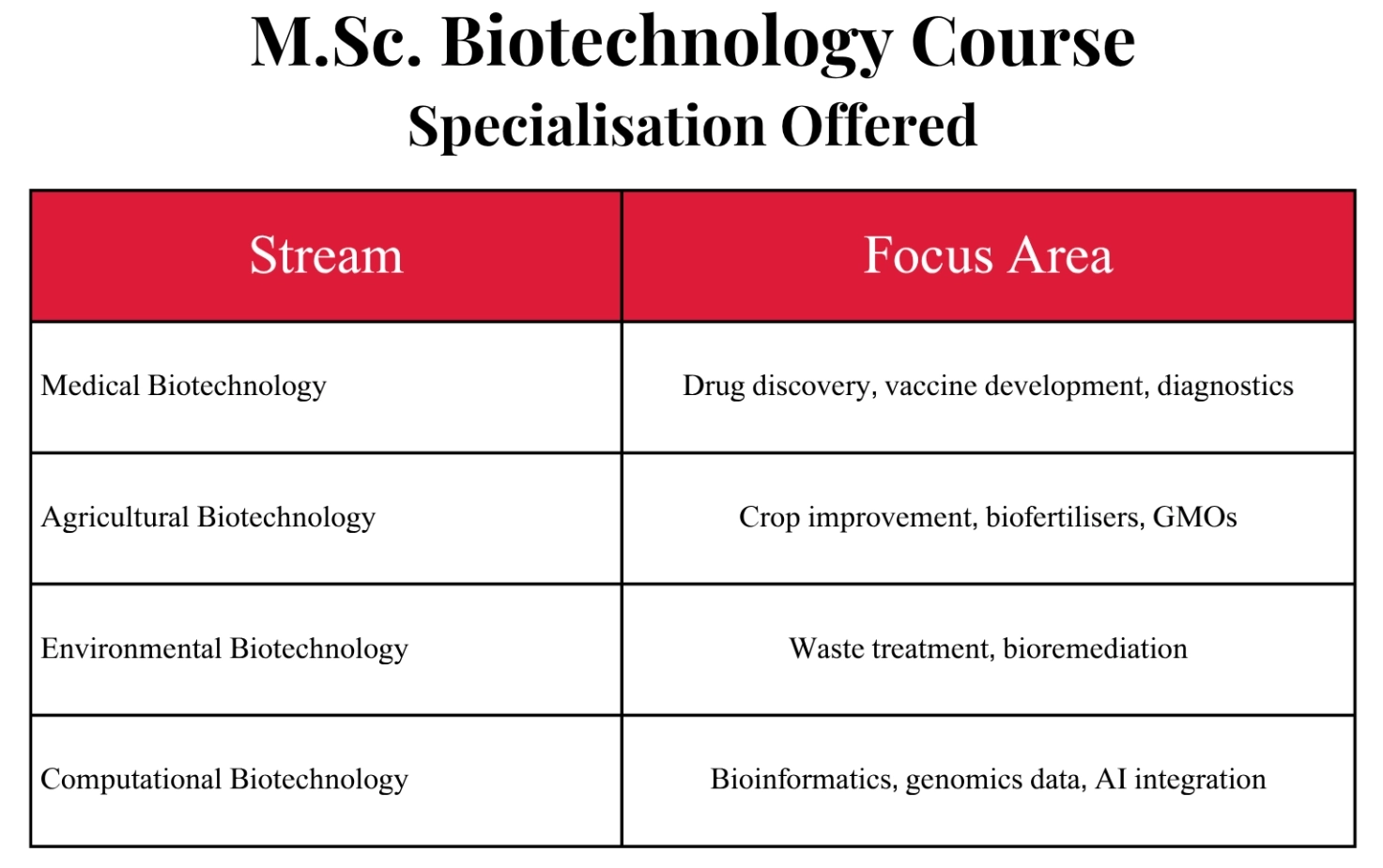How M.Sc. Biotechnology Prepare You for a Diverse Range of Careers?

Think of bacteria cleaning oil spills. Imagine crops that grow without harming the earth. Now picture genetic codes helping doctors cure the incurable. Sounds futuristic?
But now it’s all happening!
Thanks to biotechnology.
In the past decade, biotechnology has not just been about test tubes and petri dishes. It has moved nearly to every sector- agriculture, healthcare, environmental conservation or artificial intelligence. The result?
The shift has created an enormous global demand for biotechnologists. According to Grand View Research, the global biotechnology market is forecasted to reach USD 3.88 trillion by 2030, growing at a CAGR of 13.96%.
That’s why pursuing M.Sc. Biotechnology to enhance your skills and advance your knowledge helps you to enter this most dynamic industry today. Here in this blog, learn about how this programme shapes scientific thinkers into innovators!
Is M.Sc. Biotechnology Worth It? Here’s Why the Answer Is Yes
Biotechnology is transforming at an unparalleled pace. The field has witnessed everything from CRISPR-based gene editing to biofuel innovation to personalised medicine and is experiencing a scientific revolution.
Pursuing a B.Sc. Biotechnology helps you build a foundation and it often limits graduates to entry-level roles. On the other hand, M.Sc. Biotechnology allows you to learn deeper and teaches you how to apply molecular techniques, design experiments and interpret complex biological data. This is what the industries actually look for when hiring experts.
What You Learn in M.Sc. Biotechnology Course?
The curriculum combines biology, chemistry as well as technology to prepare innovators who can build and innovate.
Core Scientific Skills
- Molecular biology and genetic engineering
- Biochemistry and microbiology
- Immunology and cell culture techniques
- Bioprocess engineering and industrial biotechnology
Cross-disciplinary & Soft Skills
- Data analysis using computational tools
- Scientific communication and presentation
- Project management and teamwork
- Ethical research and regulatory understanding

Top Career Paths and Job Opportunities After M.Sc. Biotechnology
| Industry/ Sector | Roles | Key Responsibilities |
|---|---|---|
| Research & Academics | Research Scientist Lab Technician |
Conduct experiments Publish findings Innovate new technologies |
| Pharmaceuticals | Drug Development Analyst Quality Control Officer |
Drug formulation Clinical trials Compliance |
| Agriculture | Agri-biotech Specialist GMO Developer |
Develop pest-resistant crops Biofertilisers |
| Environmental Biotech | Environmental Biotechnologist | Waste management Bioremediation Sustainable solutions |
| Clinical Research | Clinical Research Associate | Oversee clinical trials Data management |
| Regulatory Affairs | Compliance Officer Documentation Specialist |
Handle licensing Legal compliance Documentation |
| Entrepreneurship | Biotech Start-up Founder | Start your venture in health, agri-tech and diagnostics |
How M.Sc. Biotechnology Prepares You for These Careers?
All the modules, labs and internships of the M.Sc. Biotechnology programme develops practical readiness for real-life roles
- In Capstone projects, analytical thinking and independence in researching topics are developed
- Industry linkages and internships provide professional experience
- Working on group projects to gain real leadership experience and teamwork skills
- Workshops and conferences provide networking and publication opportunities
The interrelated aspects of theory, practice and exposure prepare you with the skills and experience required by the global biotechnology sector.
Salary Insights and Global Job Market Outlook in Biotechnology
Biotechnology offers promising pay scales and global employability.
| Level | Average Annual Salary |
|---|---|
| Entry-Level | 4-6 LPA |
| Mid-Level | 7-12 LPA |
| Senior-Level | 15-25 LPA+ |
From Bangalore and Hyderabad to Boston and Zurich, some of the world’s biggest biotech clusters are expanding rapidly, backed by new research centres and startup parks.
Every Career Has Hurdles- Here’s How to Tackle Them in Biotechnology
This field has its own challenges. Research funding can be competitive and keeping up with rapid technological changes needs constant learning.
Here are some things that help you stay updated-
- Stay updated with new scientific publications
- Do internships early and network actively
- Attend seminars and work across fields
- Continue your education via certifications and online modules
Your success in biotechnology not only lies in knowledge but also in adaptability and curiosity.
Tips for Students Considering M.Sc. Biotechnology
Before you enrol, you have to follow these helpful tips for the right choice-
- Select your specialisation based on your interest and career goals
- Search for universities with strong lab infrastructure and industry linkages
- Plan your research early with internships and a dissertation
- Build your portfolio through publications, conferences and technical skills
A strong academic foundation and proactive approach can set you apart.
Innovate, Discover and Lead with Mahindra University’s M.Sc. Biotechnology
If you want to build a career in biotechnology, the M.Sc. Biotechnology programme at Mahindra University is perfect, where academic excellence meets world-class innovation.
What differentiates it from other institutions is its strong partnership with Dr Reddy’s Laboratories, one of the most respected pharmaceutical companies in India. As a result, students will be exposed to industry-level biologics research, production technologies and regulatory frameworks – this means that they are graduating as industry-ready professionals.
Here’s what makes a difference to the M.Sc. Biotechnology at Mahindra University-
- Industry-Integrated Curriculum
- Advanced Research & Lab Facilities
- Mentorship from Experts
- Career-Focused Training
- Global Perspective
You don’t just study at Mahindra University– you learn to innovate, lead with purpose and make your mark in a rapidly expanding field.
Conclusion
Biotechnology is changing all aspects of life, especially when it comes to decoding the DNA all the way to designing sustainable solutions. An M.Sc. Biotechnology doesn’t just prepare you with a study of science – it prepares you for a world of possibilities across industries, research and innovation.
If you are interested in the life sciences and want a career in a field that will be sustainable and meaningful to the world, take your next step with Mahindra University! Consider M.Sc. Biotechnology programmes at your university and get to know faculty and mentors, and prepare yourself for a new life!
FAQs
- What is the average salary of an M.Sc. Biotechnology?
The starting salary of a graduate is 4-6 lakhs per annum and after some experience and at a senior level, the salary will be around 15-25 LPA+.
- How M.Sc. Biotechnology prepares students for this field?
The course provides capstone projects and internships, which help students gain practical insights. They also connect with industry experts, join collaborative research and attend conferences.
- What core scientific skills will I gain during M.Sc. Biotechnology course?
You will gain skills in molecular biology and genetic engineering, biochemistry and microbiology, immunology and cell culture techniques, bioprocess engineering and industrial biotechnology.


























































































































































































































![Arm_Yourself_with_Deep_Business_Knowledge_&_Insights_with_PhD_Program_in_Business_Administration_at_Mahindra_University[1] Arm_Yourself_with_Deep_Business_Knowledge_&_Insights_with_PhD_Program_in_Business_Administration_at_Mahindra_University[1]](https://i0.wp.com/www.mahindrauniversity.edu.in/wp-content/uploads/2023/04/Arm_Yourself_with_Deep_Business_Knowledge__Insights_with_PhD_Program_in_Business_Administration_at_Mahindra_University1.jpg?resize=1140%2C460&ssl=1)
![Emerge_as_a_Forward_thinking_Mechanical_Engineer_with_B_1140x460[1] Emerge_as_a_Forward_thinking_Mechanical_Engineer_with_B_1140x460[1]](https://i0.wp.com/www.mahindrauniversity.edu.in/wp-content/uploads/2023/04/Emerge_as_a_Forward_thinking_Mechanical_Engineer_with_B_1140x4601.jpg?resize=1140%2C460&ssl=1)
![B.Tech_in_Computer_Science_Engineering_(BTech_CSE)_Your_Gateway_to_Become_a_Computer_Genius_1140x460[1] B.Tech_in_Computer_Science_Engineering_(BTech_CSE)_Your_Gateway_to_Become_a_Computer_Genius_1140x460[1]](https://i0.wp.com/www.mahindrauniversity.edu.in/wp-content/uploads/2023/04/B.Tech_in_Computer_Science_Engineering_BTech_CSE_Your_Gateway_to_Become_a_Computer_Genius_1140x4601.jpg?resize=1140%2C460&ssl=1)
![Digital_Marketing_is_Booming_Globally_1140x460[1] Digital_Marketing_is_Booming_Globally_1140x460[1]](https://i0.wp.com/www.mahindrauniversity.edu.in/wp-content/uploads/2023/04/Digital_Marketing_is_Booming_Globally_1140x4601.jpg?resize=1140%2C460&ssl=1)
![MU_Electrical20Computer20Engineering_1140x460[1] MU_Electrical20Computer20Engineering_1140x460[1]](https://i0.wp.com/www.mahindrauniversity.edu.in/wp-content/uploads/2023/04/MU_Electrical20Computer20Engineering_1140x4601.jpg?resize=1140%2C460&ssl=1)
![BA_LLB_Hons_Course_at_Mahindra_University[1] BA_LLB_Hons_Course_at_Mahindra_University[1]](https://i0.wp.com/www.mahindrauniversity.edu.in/wp-content/uploads/2023/04/BA_LLB_Hons_Course_at_Mahindra_University1.webp?resize=1140%2C460&ssl=1)
![Management_&_Business_Administration_is_Tremendously_High[1] Management_&_Business_Administration_is_Tremendously_High[1]](https://i0.wp.com/www.mahindrauniversity.edu.in/wp-content/uploads/2023/04/Management__Business_Administration_is_Tremendously_High1.jpg?resize=1140%2C460&ssl=1)

![whyistraining&placementcellimportant[1] whyistraining&placementcellimportant[1]](https://i0.wp.com/www.mahindrauniversity.edu.in/wp-content/uploads/2023/04/why20is20training2020placement20cell20important1.png?resize=1140%2C460&ssl=1)
![TheDifferencesbetweenRights&Duties[1] TheDifferencesbetweenRights&Duties[1]](https://i0.wp.com/www.mahindrauniversity.edu.in/wp-content/uploads/2023/04/The20Differences20between20Rights2020Duties1.png?resize=1140%2C460&ssl=1)
![sleep_deprivation[1] sleep_deprivation[1]](https://i0.wp.com/www.mahindrauniversity.edu.in/wp-content/uploads/2023/04/sleep_deprivation1.jpg?resize=1140%2C460&ssl=1)
![SelfLoveBlogImage2[1] SelfLoveBlogImage2[1]](https://i0.wp.com/www.mahindrauniversity.edu.in/wp-content/uploads/2023/04/Self20Love20Blog20Image2021.png?resize=1140%2C460&ssl=1)


























































































































